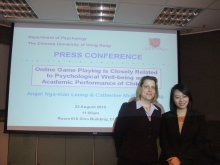CUHK
News Centre
CUHK Psychology Department Discovers Online Game Playing is Closely Related to Psychological Well-being and Academic Performance of Children
To understand the overall computer gaming habit of Hong Kong Chinese students, and the relationship between online game playing and the psychological well-being and academic performance of early adolescents, Dr. Angel Nga-man Leung and Prof. Catherine McBride of the Department of Psychology, The Chinese University of Hong Kong (CUHK), carried out a large-scale research study on 626 primary 5 and 6 students (mean age =10.81 years old; 318 boys, 308 girls). Students completed questionnaires from November 2009 to February 2010. The research mainly investigated: i) the average time children spent on computer games; ii) the prevalence of cyberbullying; iii) the relationship of online friendship and cyberbullying on psychological well-being; and iv) the relationship between the time spent on computer games and academic performance.
There are four common types of computer games. The average time children spent on these four types of games was: 67 minutes on Massively Multi-player Online Games (MMOGs), 44 minutes on solitary computer games, 44 minutes on handheld video games, and 31 minutes on home video consoles (see Table 1).
Scales to measure cyberbullying and cyber-victimization are developed in this study (see Table 2). In this survey, 31.2% of the participants reported having acted as cyberbullies, and 4% was regarded as frequent cyberbullies; 47.3% of the participants had been cyber-victims at least once, and 5.3% reported being frequent cyber-victims (see Table 3).
In MMOGs, students play the games with others on the internet. It is likely for them to develop or strengthen friendship by interacting with other players. Moreover, being the most popular computer game among children and teens, it was found that 55.8% of the participants have played MMOGs before, and 93.4% among them have played MMOGs with real friends and/or online friends, suggesting playing MMOGs is a kind of social experiences (see Table 4).
In order to compare and contrast friendship in real life versus friendship in MMOGs, participants were asked to compare the quality of friendship that they experienced from the best friend in MMOGs versus the best friend in real life (e.g. school, playground). The best friend could be the same or a different person in the two contexts. The relative quality of both friendships is shown in Table 5. 73% of them indicated that their best friends in reality and in MMOGs are two different people, while 26.2% of them suggested that they do not know the best friend in MMOGs in reality. Despite the fact that friendship quality in MMOGs is less comparable to the one in real life, the more online friendship a child reported experiencing in the MMOG context, the better the child’s psychological well-being was (social competence, life satisfaction, friendship satisfaction and self esteem). At the same time, cyber-victimization was negatively related to all psychological constructs tested (see Table 6).
In addition, the overall time spent on computer games was found to be negatively correlated with academic performance across Chinese, English, Mathematics and General Studies (See Table 7).
This research indicates that online game playing is likely multifaceted in its effects. Such game playing may be a positive experience from the perspective of friendship development, but parents and teachers should also be vigilant about cyber-victimization and cyberbullying. The time children spent playing computer games should also be limited.





